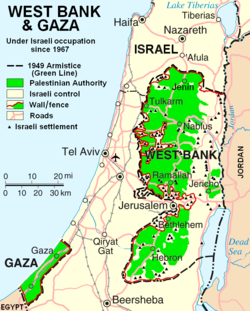Palestinian - Israeli conflict
| Israeli–Palestinian conflict | |||||||||
|---|---|---|---|---|---|---|---|---|---|
| Part of the Arab–Israeli conflict | |||||||||
 Central Israel next to the Palestinian National Authority in the West Bank and the Gaza Strip, 2007 |
|||||||||
|
|||||||||
| Belligerents | |||||||||
|
|
|
||||||||
|
Supported by:
|
Supported by:
|
||||||||
The Israeli–Palestinian conflict (Hebrew: הסכסוך הישראלי-פלסטיני, translit. Ha'Sikhsukh Ha'Yisraeli-Falestini; Arabic: النزاع-الفلسطيني الإسرائيلي, translit. al-Niza'a al-Filastini-al-Israili) is the ongoing struggle between Israelis and Palestinians that began in the mid-20th century. The origins to the conflict can be traced back to Jewish immigration, and sectarian conflict in Mandatory Palestine between Jews and Arabs. It has been referred to as the world's "most intractable conflict", with the ongoing Israeli occupation of the West Bank and the Gaza Strip reaching 50 years.
Despite a long-term peace process and the general reconciliation of Israel with Egypt and Jordan, Israelis and Palestinians have failed to reach a final peace agreement. The key issues are: mutual recognition, borders, security, water rights, control of Jerusalem, Israeli settlements,Palestinian freedom of movement, and Palestinian right of return. The violence of the conflict, in a region rich in sites of historic, cultural and religious interest worldwide, has been the object of numerous international conferences dealing with historic rights, security issues and human rights, and has been a factor hampering tourism in and general access to areas that are hotly contested.
Many attempts have been made to broker a two-state solution, involving the creation of an independent Palestinian state alongside the State of Israel (after Israel's establishment in 1948). In 2007, the majority of both Israelis and Palestinians, according to a number of polls, preferred the two-state solution over any other solution as a means of resolving the conflict. Moreover, a majority of Jews see the Palestinians' demand for an independent state as just, and thinks Israel can agree to the establishment of such a state. The majority of Palestinians and Israelis in the West Bank and Gaza Strip have expressed a preference for a two-state solution. Mutual distrust and significant disagreements are deep over basic issues, as is the reciprocal scepticism about the other side's commitment to upholding obligations in an eventual agreement.
...
Wikipedia
